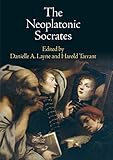The Neoplatonic Socrates / / ed. by Danielle A. Layne, Harold Tarrant.
Material type: TextPublisher: Philadelphia : : University of Pennsylvania Press, [2014]Copyright date: ©2014Description: 1 online resource (264 p.)Content type:
TextPublisher: Philadelphia : : University of Pennsylvania Press, [2014]Copyright date: ©2014Description: 1 online resource (264 p.)Content type: - 9780812246292
- 9780812210002
- 183/.2 23
- online - DeGruyter
| Item type | Current library | Call number | URL | Status | Notes | Barcode | |
|---|---|---|---|---|---|---|---|
 eBook
eBook
|
Biblioteca "Angelicum" Pont. Univ. S.Tommaso d'Aquino Nuvola online | online - DeGruyter (Browse shelf(Opens below)) | Online access | Not for loan (Accesso limitato) | Accesso per gli utenti autorizzati / Access for authorized users | (dgr)9780812210002 |
Frontmatter -- Contents -- Introduction -- Chapter 1. Socratic Love in Neoplatonism -- Chapter 2. Plutarch and Apuleius on Socrates' Daimonion -- Chapter 3. The Daimonion of Socrates: Daimones and Divination in Neoplatonism -- Chapter 4. Socrates in the Neoplatonic Psychology of Hermias -- Chapter 5. The Character of Socrates and the Good of Dialogue Form: Neoplatonic Hermeneutics -- Chapter 6. Hypostasizing Socrates -- Chapter 7. Socratic Character: Proclus on the Function of Erotic Intellect -- Chapter 8. The Elenctic Strategies of Socrates: The Alcibiades I and the Commentary of Olympiodorus -- Chapter 9. Akrasia and Enkrateia in Simplicius's Commentary on Epictetus's Encheiridion -- Chapter 10. The Many-Voiced Socrates: Neoplatonist Sensitivity to Socrates' Change of Register -- Conclusion -- Appendix: The Reception of Socrates in Late Antiquity: Authors, Texts, and Notable References -- Notes -- Bibliography -- Contributors -- General Index -- Acknowledgments
restricted access online access with authorization star
http://purl.org/coar/access_right/c_16ec
Today the name Socrates invokes a powerful idealization of wisdom and nobility that would surprise many of his contemporaries, who excoriated the philosopher for corrupting youth. The problem of who Socrates "really" was-the true history of his activities and beliefs-has long been thought insoluble, and most recent Socratic studies have instead focused on reconstructing his legacy and tracing his ideas through other philosophical traditions. But this scholarship has neglected to examine closely a period of philosophy that has much to reveal about what Socrates stood for and how he taught: the Neoplatonic tradition of the first six centuries C.E., which at times decried or denied his importance yet relied on his methods.In The Neoplatonic Socrates, leading scholars in classics and philosophy address this gap by examining Neoplatonic attitudes toward the Socratic method, Socratic love, Socrates's divine mission and moral example, and the much-debated issue of moral rectitude. Collectively, they demonstrate the importance of Socrates for the majority of Neoplatonists, a point that has often been questioned owing to the comparative neglect of surviving commentaries on the Alcibiades, Gorgias, Phaedo, and Phaedrus, in favor of dialogues dealing explicitly with metaphysical issues. Supplemented with a contextualizing introduction and a substantial appendix detailing where evidence for Socrates can be found in the extant literature, The Neoplatonic Socrates makes a clear case for the significant place Socrates held in the education and philosophy of late antiquity.Contributors: Crystal Addey, James M. Ambury, John F. Finamore, Michael Griffin, Marilynn Lawrence, Danielle A. Layne, Christina-Panagiota Manolea, François Renaud, Geert Roskam, Harold Tarrant.
Mode of access: Internet via World Wide Web.
In English.
Description based on online resource; title from PDF title page (publisher's Web site, viewed 18. Sep 2023)


